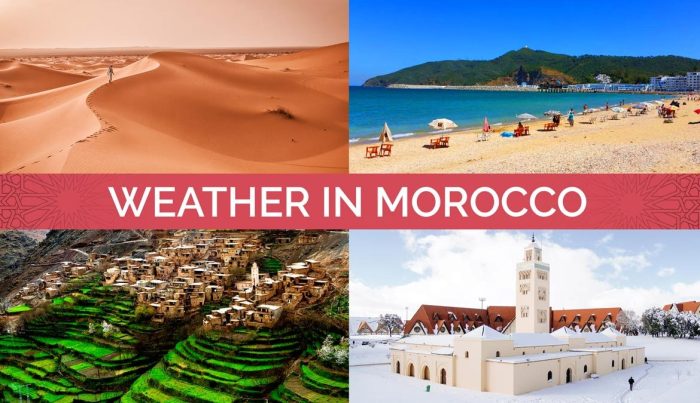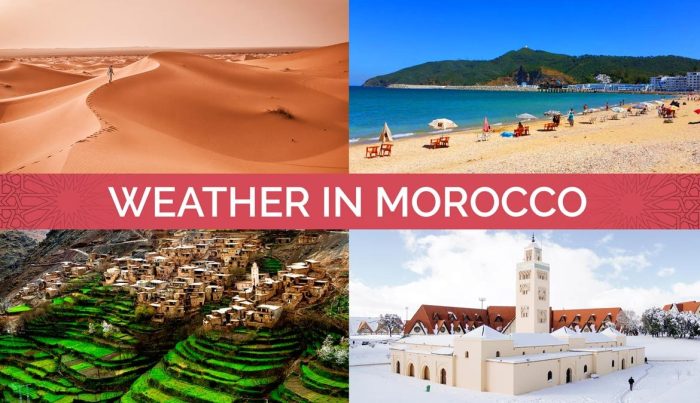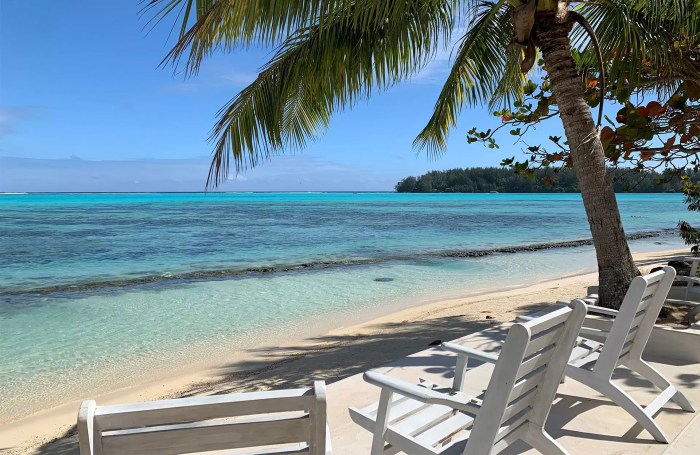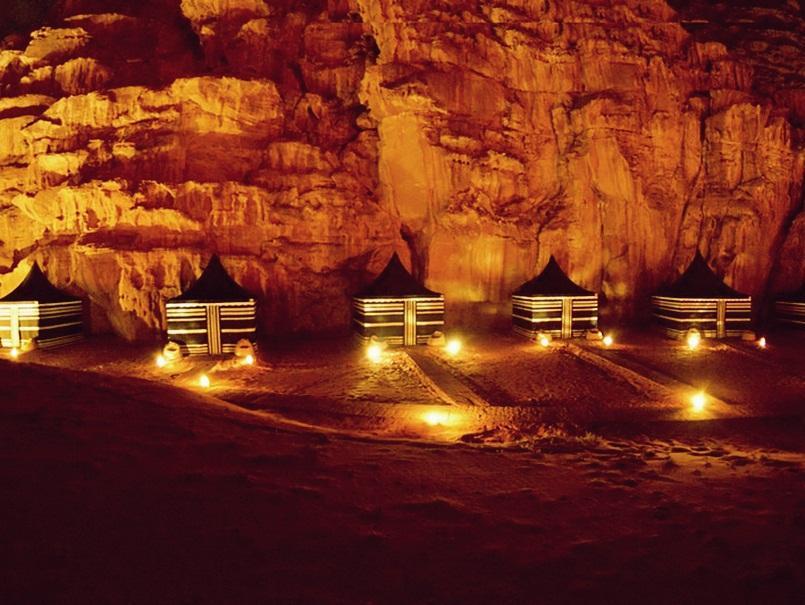Morocco weather february 2023 – Discover the weather conditions expected in Morocco during February 2023, with this comprehensive guide. From average temperatures to precipitation patterns, this article provides valuable insights for travelers, adventurers, and locals alike.
With detailed regional forecasts, historical data analysis, and practical tips for planning your trip, this guide empowers you to make informed decisions and embrace the unique weather experiences that Morocco has to offer.
Temperature and Humidity
Morocco’s weather in February 2023 is characterized by mild temperatures and generally low humidity levels. The average temperature ranges from 12°C (53.6°F) at night to 20°C (68°F) during the day, making it a comfortable time to visit the country.
Humidity levels in Morocco during February are typically low, ranging from 50% to 60%. This low humidity makes it feel less hot during the day and less cold at night, increasing comfort levels.
Regional Variations
There are some regional variations in temperature and humidity in Morocco during February. The coastal regions, such as Casablanca and Agadir, tend to have milder temperatures and higher humidity levels than the inland regions, such as Marrakech and Fez. The mountainous regions, such as the Atlas Mountains, can experience colder temperatures and occasional snowfall.
Precipitation and Cloud Cover
In February, Morocco experiences relatively low precipitation, with rainfall concentrated in the northern and western regions. The southern and eastern regions tend to be drier, with less frequent and intense rainfall.
Cloud cover is generally moderate to high during February, with more overcast conditions in the northern and western regions. The cloud cover can affect sunlight exposure, particularly in the morning and evening hours.
Potential Weather Systems
During February, Morocco may be influenced by weather systems such as:
- Atlantic depressions: These systems bring periods of rain and strong winds to the northern and western regions.
- Saharan depressions: These systems can bring dust and haze to the southern and eastern regions, occasionally accompanied by light rain.
Wind Patterns and Speed
During February 2023, Morocco experiences predominantly westerly to northwesterly winds. These winds originate from the Atlantic Ocean and carry moisture and cooler temperatures to the country.
Average Wind Speeds
Average wind speeds in Morocco during February range from 10 to 20 kilometers per hour (6 to 12 miles per hour). However, stronger gusts are possible, especially along the coast and in mountainous areas.
The weather in Morocco in February 2023 is expected to be mild and sunny, with average temperatures ranging from 12 to 20 degrees Celsius. If you’re planning a trip to Morocco during this time, consider booking train tickets from Vancouver to Seattle to explore the Pacific Northwest before or after your Moroccan adventure.
Upon returning to Morocco, the pleasant February weather will provide ample opportunities to explore its vibrant cities, historical landmarks, and stunning natural landscapes.
Expected Variations
Wind speeds can vary throughout the month, with stronger winds typically occurring during the first half of February. Towards the end of the month, winds tend to become lighter and more variable.
Impact on Outdoor Activities and Travel
The prevailing wind patterns and speeds in Morocco during February can have an impact on outdoor activities and travel.
- Hiking and Camping:Strong winds can make hiking and camping challenging, especially in mountainous areas. It is important to be aware of wind conditions before venturing outdoors.
- Water Sports:Wind can affect water sports such as surfing, sailing, and windsurfing. Stronger winds can create larger waves and make water activities more challenging or dangerous.
- Travel:Strong winds can also affect travel, especially air travel. Delays or cancellations are possible, particularly in areas with strong crosswinds.
Historical Weather Data
Analyzing historical weather data for February in Morocco provides valuable insights into the expected weather conditions and helps identify patterns and anomalies. This information is crucial for planning outdoor activities and travel, as it can help anticipate potential weather-related challenges or opportunities.
Temperature Trends
Historically, February temperatures in Morocco exhibit a gradual increase from the beginning to the end of the month. The average temperature in major cities like Marrakech and Casablanca ranges from 12-15°C (54-59°F) at the start of February to 16-19°C (61-66°F) by the end of the month.
However, it’s important to note that daily temperatures can fluctuate, with occasional warm or cold spells.
Precipitation Patterns, Morocco weather february 2023
February is generally a dry month in Morocco, with average precipitation ranging from 20-40 mm (0.8-1.6 inches) across the country. Precipitation is more common in the northern and coastal regions, while the southern and eastern parts tend to be drier.
However, occasional rainfall or showers can occur throughout the month, particularly in the mountainous areas.
Wind Patterns
February typically experiences moderate to strong winds, with an average wind speed ranging from 15-25 km/h (9-16 mph). The prevailing wind direction is from the west or southwest, bringing in moisture from the Atlantic Ocean. Stronger winds can occur during storms or weather fronts, especially in coastal areas.
Implications for Planning
Understanding historical weather data is essential for planning outdoor activities and travel in Morocco during February. The generally mild temperatures and low precipitation make it a suitable time for sightseeing, hiking, and other outdoor pursuits. However, it’s advisable to be prepared for occasional rain or wind, especially in mountainous or coastal areas.
Packing layers of clothing and waterproof gear is recommended to adapt to changing weather conditions.
Regional Differences

Morocco’s diverse geography results in significant regional weather variations. The proximity to the Atlantic Ocean, the Atlas Mountains, and the Sahara Desert strongly influences local weather patterns.
Northern Morocco
* Coastal areas experience mild temperatures, averaging 15-20°C (59-68°F) in February.
- Proximity to the ocean brings occasional rainfall and higher humidity levels.
- The Rif Mountains create a rain shadow effect, resulting in drier conditions inland.
Central Morocco
* Inland regions have a continental climate with larger temperature fluctuations.
- Daytime temperatures range from 10-15°C (50-59°F), while nights can be chilly, dropping to 5-10°C (41-50°F).
- Precipitation is less frequent compared to the north, but occasional showers may occur.
Southern Morocco
* The Sahara Desert influences weather patterns in the south.
- Daytime temperatures soar to 20-25°C (68-77°F), while nights remain cool, around 10-15°C (50-59°F).
- Rainfall is scarce, and the region is characterized by low humidity and clear skies.
Mountainous Regions
* The Atlas Mountains experience colder temperatures, especially at higher altitudes.
- Snowfall is common during winter, particularly above 1,500 meters (4,921 feet).
- Strong winds and reduced visibility can occur in mountainous areas.
Impact on Tourism and Outdoor Activities: Morocco Weather February 2023
The pleasant weather conditions in Morocco during February present both opportunities and challenges for tourism and outdoor activities.
For travelers seeking cultural immersion, the mild temperatures and sunny skies make it an ideal time to explore historical sites, bustling souks, and vibrant cities like Marrakech, Fez, and Tangier. Guided tours and day trips to nearby attractions, such as the Atlas Mountains, are also highly recommended.
Outdoor Activities
For adventure enthusiasts, the favorable weather conditions provide ample opportunities for outdoor pursuits. Hiking trails in the High Atlas Mountains offer breathtaking views, while the Sahara Desert invites travelers to embark on camel trekking expeditions and stargazing adventures.
However, it’s important to note that some outdoor activities may be affected by occasional rainfall. Travelers should pack appropriate rain gear and waterproof footwear to stay comfortable during unexpected showers.
Clothing and Gear Recommendations
To make the most of the Moroccan weather in February, travelers should pack light, breathable clothing in layers. A lightweight jacket or sweater is advisable for evenings and cooler days, while comfortable walking shoes are essential for exploring cities and hiking trails.
For outdoor activities in the mountains or desert, it’s recommended to bring warm layers, a hat, gloves, and sunscreen. A first-aid kit and a reusable water bottle are also essential for staying safe and hydrated.
Health and Safety Considerations
Morocco’s weather in February is generally mild and pleasant, but certain health and safety precautions should be taken to ensure a comfortable and safe trip.
Staying Hydrated
The dry and sunny climate can lead to dehydration, especially during outdoor activities. It is crucial to drink plenty of fluids, particularly water, to stay hydrated and prevent heat-related illnesses.
Avoiding Extreme Temperatures
While temperatures are generally moderate in February, there can be occasional cold nights and warm days. Visitors should dress in layers to adjust to changing temperatures and avoid discomfort. Sun protection is also essential, as the sun’s rays can be strong even during winter months.
Medical Facilities and Emergency Services
Morocco has a network of medical facilities, including hospitals and clinics, that provide quality healthcare. However, it is advisable to purchase travel insurance before your trip to cover any unexpected medical expenses. Emergency services are available by dialing 112.
Travel Planning and Itinerary
February is an excellent time to visit Morocco, offering a pleasant blend of sunshine and mild temperatures. Here’s a sample itinerary that takes into account the expected weather conditions:
Day 1: Arrival in Marrakech
* Arrive in Marrakech and check into your hotel.
Explore the vibrant souks and visit the iconic Djemaa el-Fna square.
Day 2: Marrakech Highlights
* Visit the Bahia Palace, a stunning example of Moroccan architecture.
- Take a camel ride in the nearby Palmeraie.
- Enjoy a traditional Moroccan dinner at a local restaurant.
Day 3: Day Trip to Essaouira
* Embark on a day trip to the coastal city of Essaouira.
- Explore the charming medina and visit the fishing port.
- Relax on the beautiful beaches.
Day 4: Atlas Mountains Excursion
* Take a guided tour to the Atlas Mountains.
- Hike to a picturesque waterfall and enjoy the stunning scenery.
- Experience a traditional Berber village and learn about their culture.
Day 5: Departure from Marrakech
* Depart from Marrakech, bidding farewell to the vibrant city.
Best Time for Outdoor Activities
* The best time for outdoor activities in February is during the morning and late afternoon when temperatures are mild.
Avoid midday excursions, as the sun can be intense.
Packing Tips
* Pack light, breathable clothing in layers.
- Include a warm jacket or sweater for evenings.
- Bring sunscreen, sunglasses, and a hat to protect yourself from the sun.
- Consider packing a raincoat or umbrella for potential showers.
Long-Term Forecast and Climate Change
The long-term weather forecast for Morocco beyond February 2023 indicates a trend towards warmer and drier conditions.
Climate change is predicted to have a significant impact on weather patterns in Morocco, including rising temperatures, reduced precipitation, and more frequent extreme weather events such as droughts and heat waves.
Adaptation to Changing Weather Conditions
Travelers and locals can adapt to changing weather conditions by:
- Staying informed about weather forecasts and warnings.
- Adjusting travel plans and activities accordingly.
- Taking precautions to stay hydrated and protected from the sun.
- Being aware of the potential for extreme weather events and having an emergency plan in place.
Conclusion
As you plan your February adventure in Morocco, embrace the diverse weather conditions and prepare accordingly. Stay informed about potential weather systems, pack appropriate clothing, and take necessary precautions to ensure a safe and memorable journey.
Remember, Morocco’s weather in February offers a blend of sunshine, mild temperatures, and occasional precipitation, making it an ideal time to explore this captivating country.
Detailed FAQs
What are the average temperatures in Morocco during February?
Average temperatures range from 10°C (50°F) to 20°C (68°F), with higher temperatures in southern regions and coastal areas.
Is it likely to rain or snow in Morocco in February?
Rainfall is possible, especially in northern and mountainous regions. Snowfall is rare but can occur in the Atlas Mountains.
What are the prevailing wind patterns in Morocco during February?
Prevailing winds come from the northeast, bringing cool, dry air. Stronger winds can be experienced in coastal areas.
How does the weather in February compare to other months?
February is generally a mild month, with warmer temperatures than December and January, and cooler temperatures than March and April.
What precautions should I take for my health and safety in February’s weather?
Stay hydrated, wear sunscreen, and dress in layers to adapt to changing temperatures. Be aware of potential weather systems and seek shelter if necessary.



